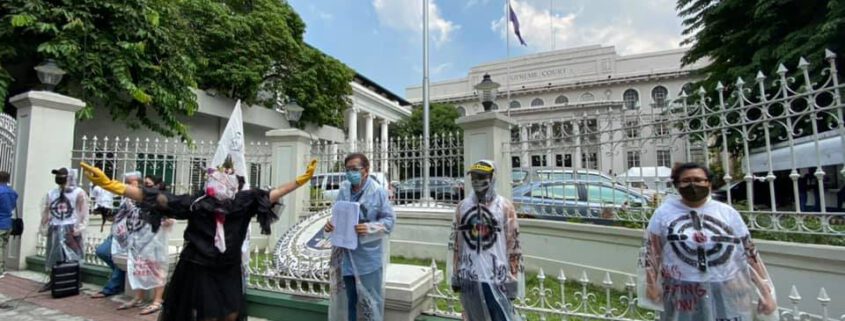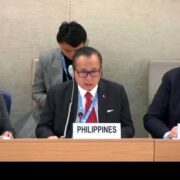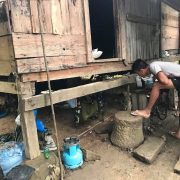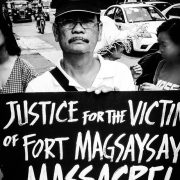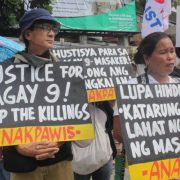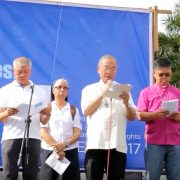High Court strikes down 2 Anti-Terror Act provisions as unconstitutional
Petioners demand junking of entire law
The Supreme Court declared as unconstitutional two provisions of Republic Act No. 1174, the Anti-Terrorism Act (ATA) of 2020, in an En Banc session last Tuesday.
The Court declared as struck down controversial portions of Sections 4 and 25 of the law that were among those contested by 37 petitions last year, its public information office announced today.
“The qualifier to the provisio in Section 4 of RA 11479 (on) ‘…which are not intended to cause death of serious physical harm to a person, to endanger a person’s life, or to create a serious risk to public safety’ by a vote of 12-3 is declared as unconstitutional for being overbroad and violative of freedom of expression,” the Court said.
Petitioner Bagong Alyansang Makabayan (BAYAN) said this decision has clarified that protests and advocacy are not considered as acts of terrorism.
“Our main win from the SC ruling on the terror law is that ACTIVISM IS NOT TERRORISM,” BAYAN secretary general Renato Reyes Jr. said.
In its December 7 decision, the Court also declared as unconstitutional by a vote of 9-6 the second method for designation in Section 25 paragraph 2 of RA 11479, “Request for designations by other jurisdictions or supranational jurisdictions may be adopted by the ATC (Anti-Terrorism Council) after determination that the proposed designee meets the criteria for designation of UNSCR (United Nations Security Council) No. 1373.”
The court added that all other challenged provisions are not unconstitutional on the basis of the petitions against it.
‘Still dangerous’
Reyes however warned that the other contested provisions declared as not unconstitutional by the decision may still be abused by the ATC created by the law.
“Other dangerous provisions on designation, proscription, warrant-less arrests and prolonged detention remain and must be challenged. We will prepare our motion for reconsideration as we study the SC ruling when it is released,” Reyes said.
Karapatan Alliance for the Advancement of People’s Rights secretary general Cristina Palabay, also a petitioner, said her group is dismayed by the Court’s decision to retain other “draconian provisions.”
“The Supreme Court’s decision to adopt repressive provisions – the vague and overbroad definition of ‘terrorism,’ arbitrary powers of the Anti-Terrorism Council to designate and freeze assets of individuals and organizations, and the long period of warrantless detention — will only set to worsen the already dismal human rights situation in the country,” Palabay said.
Palabay also pointed out the other offenses outlined in Sections 5 (Threats to commit terrorism), 6 (Planning, training, preparing, and facilitating the commission of terrorism), 7 (Conspiracy to commit terrorism), 8 (Proposal to commit terrorism), and 9 (Inciting to commit terrorism) remain “largely vague and susceptible to subjective interpretations and therefore abuse.”
The Karapatan official added that the retention of the ATC’s “arbitrary” power to designate along with the other vague offenses in the Anti-Terrorism Act “can still be used to target dissenters.”
“The ATC’s power to designate individuals and organizations as ‘terrorists’ is not only arbitrary, as pointed out by Associate Justice Benjamin Caguioa during the oral arguments, the process of designation ‘already achieves the purpose of proscription.’ It has also proven to be deadly,” she said.
Palabay cited the 2018 Department of Justice petition to proscribe over 600 individuals as terrorists under the Human Security Act, seven of whom have eventually been murdered, including human rights worker Zara Alvarez and peace consultants Randy Malayo and Randall Echanis.
“The ATC’s power to designate is a virtual hit list. Being designated as a ‘terrorist’ is essentially a death warrant. This arbitrary power along with the retention of the 14-day period of warrantless detention in Section 29 are dangerous provisions that would only engender the commission of human rights violations including torture and enforced disappearances under the cover of implementing the terror law,” Palabay said.
Palabay said Karapatan continues to demand that the entire law must be junked and declared unconstitutional.
‘Fight isn’t over’
Bayan Muna chairperson and counsel-petitioner against the ATA Neri Colmenares said their group plans to challenge the Supreme Court’s declaration that almost all the other provisions of the law are not unconstitutional.
“We believe that it should still strike down other provisions that allow authorities to detain people for up to 24 days without charges, allows the ATC to designate terrorists at will and freeze their assets, allows authorities to detain persons already out on bail incommunicado in the guise of house arrest, and other draconian provisions,” Colmenares said.
The Senate aspirant said he and some fellow petitioners will most likely file a Motion for Reconsideration “to challenge the other provisions that have a devastating effect on human rights and civil liberties” once they get a copy of the full decision.
The Office of the Solicitor General, ATA defender during the oral arguments before the Court, has yet to comment on the SC decision. # (Raymund B. Villanueva)

